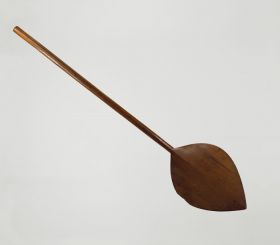Paddle fohe
Place: Tonga
Category: Fishing & hunting
wood, Tonga, l. 144.5 cm, w. 32 cm, Inv. Oz 355
Humphrey No. 233*: ‘a large Steering paddle from the Friendly Isles.’
The paddle is made of one piece of brown wood, and features some flat cavities in the surface. The blade is oval-shaped and pointed at one end. The blade is slightly damaged at one side.
The paddle was designed for rowing rather than steering. In this regard, Cook mentioned Tongan canoes carrying ‘from three to five or even six people and are row’d with paddles of about four feet long with an oval, pointed blade which sets them along at a very quick rate.’ (Beaglehole 1967, IIIb: 936; see also Beaglehole 1961, II: 264).
An object of the same (fohe) type is located in Stockholm (Söderström 1939: 43f.). Inken Köhler, Ulrike Rehr, Gundolf Krüger
Sources
Beaglehole, John Cawte, The Journals of Captain James Cook on his Voyages of Discovery. The Voyage of the Resolution and Adventure 1772-1775, Hakluyt Society, Extra Series, 35, vol. 2, Cambridge University Press, Cambridge, 1955-1961 II.
Beaglehole, John Cawte, The Journals of Captain James Cook on his Voyages of Discovery The Voyage of the Resolution and Discovery 1776-1780, Hakluyt Society, Extra Series, 36, 1 u. 2. vol. 3, Cambridge University Press, Cambridge, 1955-1967 IIIa and IIIb.
Söderström, Jan, A. Sparrman’s Ethnographical Collection from James Cook’s 2nd Expedition (1772-75), New Series, Publication no. 6, The Ethnographical Museum of Sweden, Stockholm, 1939.

